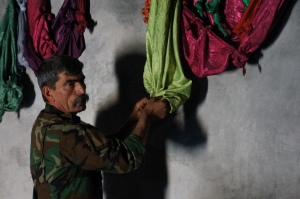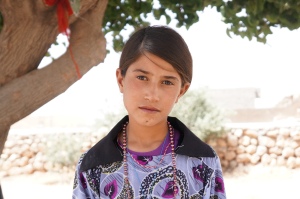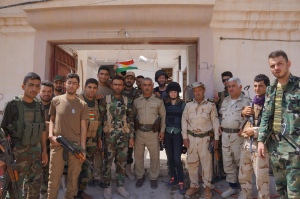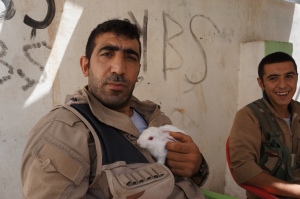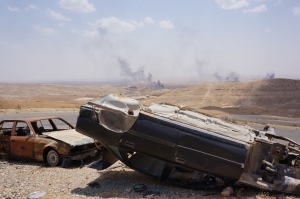I wrote this back in May, and although I met with no KDP Peshmerga, the Kurds fighting on the frontline were united. With the Peshmerga Ministry yesterday announcing that no fighters from the PKK, YPG etc would be allowed to participate in the Sinjar operation, it seems a good time to revisit what might be lost.
As our driver carves down the final descent from Mount Sinjar into the town below, we pass ten or more upturned cars, some with clothing spilled onto the side of the road. The burnt out husks are testament to those that perished at the hands of Islamic State (IS) as they fled their homes in the town below in August of last year.
The Yazidis that sought refuge in the crucible of the mountaintop endured extreme temperatures, fatal thirst and constant insecurity.
IS have advanced up the mountain, only to be forced back, and Kurdish forces now control a frontline on the northern outskirts of the town. Thousands have been killed, and up to 5,000 women and girls kidnapped, to be traded as sex slaves in markets in IS territories.
It has been a terrible 11 months in the history of a people that chart their history in tragedy. Those on the mountain are waiting, with another blistering summer already begun, to go home. They want to trek down the mountain and breathe life back into their community.
Amid accusations of power plays between the Kurdistan Workers’ Party (PKK) and the Iraqi Kurdistan Regional Government, and even political divisions within the Iraqi Kurdish Peshmerga, it is difficult to see how Kurdish forces can take back and then protect Sinjar town.
The PKK have been locked in a guerrilla insurgency against the Ankara government for 30 years and recent attempts at establishing a lasting peace have faltered. Turkey and the Kurdistan Regional Government (KRG) enjoy close economic ties. However, since the attacks by IS, and the response in Sinjar of the PKK and closely aligned People’s Protection Units (YPG) from Syrian Kurdistan, broader Kurdish relations have improved. The Turkish government even allowed Iraqi Kurdish Peshmerga through its territory to support the PKK and YPG in Kobani at the end of 2014.
BasNews is welcomed to the Kurdish forces base by Commander Muaed Tofiq, of the Patriotic Union of Kurdistan’s (PUK) 70 Division Peshmerga. The PUK are seen as more traditionally in agreement with the left wing sentiments of the PKK.
Tofiq is unconcerned by the perceived allegiances the fighters under his command may have – in the short trip to the base the flags of the MLKP, YPG and PKK were clearly visible. One man at the base is wearing a t-shirt bearing the face of Mam Jalal Talabani, the PUK leader and former President of Iraq.
“There is no problem between the forces, they are supporting each other. The Minister of Peshmerga is responsible for all of them.”
Of greater concern to Tofiq is the lack of effective weaponry and equipment. It’s apparent that all the fighters here are under-equipped. Less than a quarter are wearing adequate shoes, with many fighters clambering through mortar debris in cheap flat soles, the backs flattened down. The only weapons are ageing AK-47s.
“We need weapons and bullets….we want anything that can help us fight IS. Our forces are wearing cheap clothes.
“It’s war time, we need fighting equipment. We bought these weapons ourselves, we were not given them by the government.”
When asked about the G3 and G36 rifles gifted to the Kurdistan Region by the German government, Tofiq’s spirit is unbowed.
“We are not getting any weapons. It’s not related to KDP or PUK or anything, we just aren’t getting any weapons. We have had no training [from the coalition]. We buy our own weapons and ammunition. Gratitude from Europe is not enough,” he says without bitterness, but perhaps just a slight crease of confusion on his brow.
In his immaculately ironed uniform and leather belt and holster, Tofiq leads us to the frontline, to meet the Kurdish forces that have been ordered by President Barzani to hold the position, not to launch an offensive.
As a shot rings out, Tofiq explains that there is no Peshmerga sniper at this position to return fire. “There is no sniper here, but we have a fighter with a BKC [a medium-sized machine gun]. We coordinate with the PKK sniper.” It appears that there is a Kurdish coalition fighting IS on the edge of town.
We are taken to the BKC position, on the first floor of a traditional house, climbing to the nest from a courtyard. The operator of the weapon, wearing the unlikely combination of a straw fedora and bayonet strapped to his chest, explains to BasNews how the Kurds are working together.
“This morning three Peshmerga and a PKK fighter coordinated, they went to bring back the body of a comrade killed by IS. When they went, IS shot at them. I helped them by covering with my BKC. They came back without the body, but safely.
“The PKK wanted to retrieve some IS equipment that had been left in the field. They got a BKC and an RPG, one of the IS fighters was killed by the Peshmerga in the operation. We are not PUK or KDP, we are KRG Peshmerga.”
Outside, fighters are sitting in the shade at the back of the house, safe from the attentions of IS snipers. Some are drinking tea, others are observing the Ramadan fast and won’t slake their thirst until iftar. The music of Rojava singer Mohammed Sherko leaks with tinny imperfection from a mobile phone.
A PKK fighter arrives, dressed in traditional sharwal trousers. He looks old enough to be carrying a weapon, but not by much. BasNews asks how old he was when he joined the PKK. Sheepishly Shevan (not his real name) replies that he hoodwinked the PKK command to join up, two years ago,
“I’m 20 years old, but I told the PKK that I’m 22 because there are some rules with the military command; they won’t accept anyone under 20, and I’ve been in the PKK since I was 18.”
He’s been in Sinjar for eight months, and refuses to leave for rest, even missing the chance to vote for the People’s Democratic Party (HDP) in his home city of Mardin during the Turkish general election earlier this month.
“The HDP is Apo’s project, which wants to collect all Kurdish ideas in one party. We’re really happy about the election, the HDP is very strong. The HDP will fight those who try to suppress Kurds in Turkey.”
Shevan is extremely distrustful of the Turkish government.
“If we say IS is our enemy, the real enemy is Turkey and Iran, they have always wanted to fight the Kurds. IS want to fight the Kurds, and of course in this case Turkey want to help IS – we have proof that many times Turkey has helped IS forces,” he says, without elaborating on the evidence.
Black smoke starts to rise from IS houses 80 metres away, and we are ushered away. IS snipers have set fire to tyres, to give them cover from jets overhead as they move positions. This action is almost always accompanied by an increase in activity, and soon gunfire is cracking through the air. Tofiq later explains the tactic.
“The problem with the snipers, they don’t fight from a stable position, they are moving every day, every night, every hour. When they burn the tyres they are changing places.
“They have dug a lot of tunnels in this area – in the night they are coming, very close to the Peshmerga and then returning by tunnel, not overground. Sometimes the coalition drop heavy bombs when they know that they’re using the tunnels, but not very often,” he says.
We move to a compound shared by the PKK, YPG and the female units of the YPJ. There is a large hole in the garden, from which earth is used to fill sandbags. In the corner a PKK fighter cuddles an albino rabbit, almost completely obscured in his hands.
Two women from the YPJ tell us that they have been in Sinjar for 45 days. One is from Amedia, the other from eastern Turkey, or Bakur, as it’s known in Kurdish. Like Shivan they remain in Sinjar when they are given leave – they tell BasNews that they are here to free the town, and won’t leave until they have.
We head back to the base for one last chat. Over a glass of tea Tofiq explains how the Kurds are trying to combat IS with limited equipment.
“Sometimes there is a conflict between IS and Kurdish cells [radios] and sometimes we hear them speaking in code for movements – ‘The seller is coming! The seller is coming!’ When we hear the voices, some of them are speaking in Turkmen, they are from Tal Afar, but the PKK understand them!” he says gleefully.
“Sometimes we hear their voice without radios, because they are so close; at night especially.” A fighter interrupts to lament the lack of night vision equipment – although one PKK fighter has a set.
We leave the base to take the switchbacks up the mountain, once more passing the cars and clothes. As we pass the ridge and drive down into the long valley which is now home to several semi-permanent tent villages, the translator turns and tells me that the Peshmerga are often insulted and harangued when they travel through this area. Many Yazidis blame them for abandoning Sinjar when IS first arrived in August last year.
But for now, on the front at least, there is Kurdish unity of purpose. Fighters from different militias are joining to confront the common enemy, sharing limited resources, good humour and linguistic skills.

